Michele Huey's Blog: God, Me, and a Cup of Tea, page 8
July 22, 2023
God Is Good
Taste and see that the LORD is good. – Psalm 34:8 (NIV)
“I am the good shepherd.” – Jesus, as quoted in John 10:11, 18 (NIV)
As a child, I was strongly encouraged to be good – obey my parents and teachers, respect my elders, do my homework, inform my parents of my whereabouts and call if I was going to be late. I wasn’t to do anything that would bring shame and dishonor to the family name. My parents taught me that “a good name is more desirable than great riches” (Proverbs 22:1).
I attended a good school – one with a reputation for academics, discipline and a faith-based curriculum. My parents were good people – honest, hardworking, faithful.
I was taught to believe that good will triumph over evil.
Foods may taste good but sometimes aren’t good for your health. A relationship may be good or bad. Ideas may be good or bad, and sometimes we have to wait to find out. Actions are good or bad. Are there any in between? Declaring something “good” requires judgment, and aren’t we supposed to not judge?
But some things are clearly good and some clearly bad. If you read Scripture, it isn’t hard to figure out which is which. God’s Word sets the standard, draws a clear line between good and bad.
In the beginning, God declared all He created “good” (see Genesis 1). How could creation not reflect the Creator? And the Creator is good.
God didn’t become good. He always was good. God cannot lose His goodness. He is, was, and always will be everything that the word encompasses.
What does “good” encompass? My dictionary defines “good” as “excellent; right, as it ought to be; desirable; satisfying; pleasant; kind; friendly; real, genuine; beneficial.” To that I add: “whatever is true, noble, right, pure, lovely, admirable, excellent and praiseworthy” (Philippians 4:8).
I look at today’s world and think we as a society have stopped believing in good. Life and culture have led us to believe that evil has eclipsed good. That good is weak, and bad is strong. That “good” is a thing of the past.
I refuse to believe that. Good is still a force to be reckoned with. Good is still stronger than evil.
How do I know?
Because God is good. And God is not dead. Nor is He passive. He’s very much alive and active in the world today.
I chose today’s Scripture readings, Psalm 23 and John 10, carefully. Meditate on all the Good Shepherd does for you personally: He leads, He provides, He protects, He restores, He refreshes, He comforts, He loves – so much that He lays down His own life so you, the sheep, may live.
“The LORD is good to all,” the psalmist writes, “He has compassion on all that He has made” (Psalm 145:9). Still true.
“The earth is full of the goodness of the LORD” (Psalm 33:5 NKJV).
We need only eyes to see, ears to hear and a heart that responds in child-like faith and trust. What you focus on is what you see.
It’s your choice.
Open my eyes, my heart, my mind and my spirit to Your goodness, O Lord. Amen.
Read and reflect on Psalm 23 and John 10:1–18.
From God, Me, & a Cup of Tea, Vol. 3 © 2019 Michele Huey. All rights reserved.
July 15, 2023
F – ALWAYS FAITHFUL
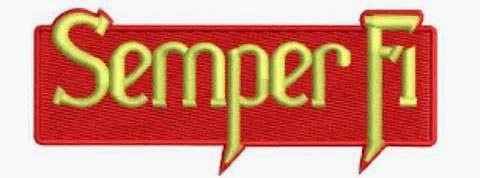
Thy steadfast love, O LORD, extends to the heavens, thy faithfulness to the clouds. – Psalm 36:5 (RSV)
If we are faithless [do not believe and are untrue to Him], He remains true (faithful to His Word and His righteous character), for He cannot deny Himself. – 2 Timothy 2:13 (Amp)
One of my favorite shows when I was growing up was The Lone Ranger. I remember how Tonto often called him “Kimo sabe.” I never knew what “Kimo sabe” meant until the name popped up while I was writing The Heart Remembers. Curious, I looked it up online.
“Kimo sabe,” I learned, means “faithful friend.”
How perfect, I thought. My novel is about love and faithfulness.
Faithfulness.
Someone who is faithful always does what he says he will do, no matter what. Someone who is faithful remains loyal in what she thinks, says, and does.
The motto for the U.S. Marine Corps is Semper Fidelis – Always faithful. Faithful in all ways.
My husband is a former Marine. Semper Fi describes him perfectly. He is faithful, loyal and true to the core. I’m a blessed woman.
Twice blessed. Not only is my husband faithful, but my God is also.
Life can get pretty frightening at times, the future a big question mark. Things haven’t panned out the way we’d planned. What next?
During the taping of our radio interview last week, WMUG 105.1 FM (Indiana, PA) radio personality Lillian O. Clemons told me she leaves jigsaw puzzle pieces around everywhere – in the rooms of her house, in her car – to remind her when life doesn’t make sense that she sees only a piece of the puzzle. God alone sees the entire picture.
“I love that analogy,” I told her. “I can’t see the future. I don’t know what tomorrow holds. But when I look back on my life, I can see how God was working to prepare me for where I am now, what I’m facing today. I know I can trust God with my future because He’s always had my back in the past.”
Even when I didn’t know Him, God knew me, had a plan and purpose for me (see Psalm 138:8; Psalm 139). When I thought I was the one in control, when I ignored God and went my own way, did my own thing, God gave me the freedom to wander.
A verse in a song I wrote describes this period of my life:
Now the path I chose was wide; all my hopes and dreams were there. I was having so much fun chasing rainbows in the air. But in time they disappeared, and all that remained were empty hopes and broken dreams and a heart full of pain.
That’s when I came to Peniel (see the story of Jacob in Genesis 28 and 32), where faithful God was waiting for unfaithful me. That’s where I wrestled, surrendered, and found forgiveness, hope, and unconditional love. That’s where I experienced a true heart change. Where I realized “self control” was dangerous. What I needed for a fulfilled life was “God control.”
“Never be afraid to trust an unknown future to a known God,” Corrie ten Boom, author of The Hiding Place, once said.
I began trusting God with the next step. And the next one.
And I haven’t ever, even for a second, regretted it.
Thank you, Father God, that You are faithful even when I’m not. Thank you for Your mercies that are new every morning. Amen.
Read and reflect on Lamentations 3:22–23.
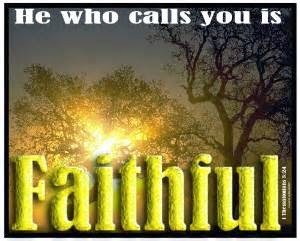
July 8, 2023
E – GOD, THE ETERNAL ONE
The ABC’s of knowing God better: the letter E

Read and reflect on 1 John 5:11–12.
Abraham planted a tamarisk tree in Beersheba, and there he called on the name of the LORD, the Eternal One. – Genesis 21:33 (NIV)
He has also set eternity in the hearts of men. – Ecclesiastes 3:11b (NIV)
There’s a scene in Macbeth in which Shakespeare, who wrote the play to get on the good side of King James I, uses an apparition of a line of eight kings, the last one holding a mirror, to imply that the family of James I would hold the throne forever.
Forever. Eternity. That’s a long time. In fact, it isn’t time. Because time is measured – in seconds, minutes, hours, days, weeks, months, years, decades, centuries, millennia. Eternity cannot be measured. There is no time as we know it in eternity.
The apostle Peter tried to explain it when he wrote, “With the Lord a day is like a thousand years, and a thousand years are like a day” (2 Peter 3:8).
We’ve come to the letter “E” in our series of getting to know God better using the letters of the alphabet.
God is ETERNAL. His being spans past, present and future. “I am the Alpha and the Omega,” he says in Revelation, “the One who is, who was, and who is to come” (1:8).
God had no beginning. He always has been.
God IS, present tense. Contrary to the belief of nineteenth century German philosopher Freidrich Nietzsche, which has echoed down through the centuries, God is not dead.
God will always be. A mirror facing a mirror into infinity.
What does this have to do with us?
For the answer, I turn to God’s Word:
“He has placed eternity in the hearts of men” (Ecclesiastes 3:11).
“The LORD God formed man from the dust of the ground and breathed into his nostrils the breath of life, and man became a living being” (Genesis 2:7).
God Himself breathed life into us.
We are not just physical bodies walking around on the planet. We are also mental beings because we have a brain. We are emotional beings because we have a heart that feels joy and pain and everything in between. We are spiritual beings because we have a soul that God breathed into us, a spirit that is restless and empty until we anchor ourselves in the One who made us and Who calls to us to know Him, fill our empty selves with Himself, with His life, and spend eternity with Him.
“Lord, Thy madest us for Thyself,” wrote St. Augustine, “and we can find no rest till we find rest in Thee.”
“Since were made for eternity,” one commentator notes, “the things of time cannot fully and permanently satisfy.”
Jesus’ words to the Samaritan woman whom He met at the well reverberate through time to us today: “Whoever drinks the water I give him will never thirst. Indeed, the water I give him will become in him a spring of water welling up into eternal life” (John 4:14).
“He has placed eternity in the hearts of men.” God has placed in each of us a longing that cannot be satisfied with anything but Him.
“You will seek me and find me when you seek me with all your heart,” God tells us (Jeremiah 29:13).
God is eternal, and He wants to share eternity with you.
Have you found Him? Are you seeking?
He isn’t far – only a breath away.
Thank you, Father, that You loved me so much that You made the way for me to spend eternity with you. Amen.
From God, Me, & a Cup of Tea, Vol. 3 © 2019 Michele Huey. All rights reserved. Used with permission.
July 1, 2023
That’s America!
Blessed is the nation whose God is the LORD. – Psalm 33:12 (NIV)
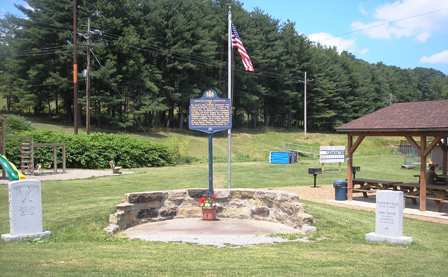
Every time I go to town, I pass the Rossiter baseball field. And I think . . .
Now, that’s America!
Let me tell you why.
Every spring, dedicated volunteers clean up and ready the fields for the season. Before every game, the infield is raked, the baselines limed, and the bases put in place. Between games the outfield grass is kept clipped and neat.
Volunteers—you’ll find them everywhere, in hospitals, libraries, historical societies, and on Little League fields. As I think of this powerful force that helps to keep things running better and smoother, I think . . .
Now, that’s America!
Each year improvements are made to the ball field area. New bleachers, a playground, a port-a-potty, a picnic pavilion, and a lighted flagpole atop which Old Glory flies day and night, have been added. Facing the bleachers is an old fashioned scoreboard, where someone keeps the runs tallied as runners cross the plate.
Sponsors’ signs hang on the chain link fence surrounding the field.
One fall heavy rains flooded the small town of less than a thousand and damaged the outfield fence. Then, one winter, the section of fence near the road came down due to either heavy snow or an out-of-control vehicle. All repairs were made before the season started.
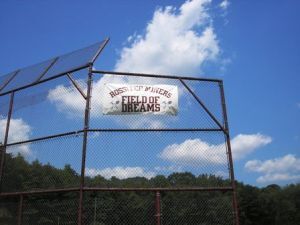
I think of these local business owners who dip into their pockets even in trying economic times to donate needed cash for the upkeep of the “Field of Dreams,” and I think . . .
Now, that’s America!
Folks watch the games from their porches across the road and in the shade on the hill on the third base side—across the creek where foul balls often splash and kids scramble to retrieve them. Canvas chairs fill up the spectators’ area as game time nears. I think of baseball fans that fill the bleachers in every town across America to cheer on sons, grandsons, nephews, neighbors, and the teams they love, and I think . . .
Now, that’s America!
Rossiter was born in 1901 during the coal boom era in western Pennsylvania. For the longest time, a stark black mountain of residue left from the mines shadowed the ball field, the first thing I’d see coming down the hill into this former coal mining town. But that ugly landmark has since been removed, replaced by the verdant hillside where fans watch the games in the shade of trees and set off noisemakers when the Miners score a homerun.
The Rossiter ball team named themselves for the men who made their living in the bowels of the earth and whose families grew the town that has survived even though the mines shut down in the late 1940s. I think of folks like these who eke out a living during boom times and bust times, and survive and grow, and I think . . .
Now, that’s America!
Down the street from the ball field is a relatively new building—built on the ground where the Rossiter School once stood. American Legion Post 582. And I think of the men and women who have served this country down through the years, from the signing of Declaration of Independence to the fighting of Communism and terrorists across the globe, and I think . . .
Now, that’s America!
Thank you, God, for this wonderful country and the men and women who make it what it is. Amen.
Read and reflect on Psalm 33.
From God, Me, & a Cup of Tea for the Seasons © 2018 Michele Huey. All rights reserved.
June 24, 2023
D – Deliverer God

The LORD is my rock, my fortress, and my deliverer. – Psalm 18:2 (NIV)
For He will deliver the needy when they cry out. – Psalm 72:12 (NIV)
I should have known better than to even try.
But when my friend, who lived next door, called one winter Wednesday and kindly chastised me for neglecting our Tuesday-Thursday exercise dates for the past month, I told her I’d see her the next day.
I figured by 1:00, the warmer temperatures and the rain would melt the mess in the driveway and the lane. So after a light lunch of yogurt and granola, I laced up my hiking boots, zipped up my Carhartt hoodie, stuffed my exercise sneakers in a plastic bag, and grabbed an umbrella.
I could have waited until it stopped pouring. I could have said, “Nuts with it” when I saw the ice in the driveway. I could have driven my pickup the two-tenths of a mile to my friend’s.
But I wanted to walk. The recent parade of snowstorms, frigid temperatures, and wind had intimidated this senior citizen to stay indoors. I missed being outside. When I bundled up and stepped out into the winter sunshine for a one-mile walk, I felt better for days.
There was no sunshine that Thursday. Only overcast skies and, when I left, a downpour. But I was determined to walk the short distance. I mean, how bad could it be?
Sometimes being stubborn isn’t good.
I surveyed the rain-covered skating rink that was my driveway. Too risky. I headed for the yard, where the snow would give me traction. Not a good idea, considering the snow came to my knees. I tried stepping in the deer tracks, but still I landed on my tushie. If any of my neighbors had been watching, I’m sure they could have gotten a good submission to America’s Funniest Home Videos.
Somehow I managed to get back on my feet and to the road, where I followed the bare spots. I made it to within a hundred feet of my destination, then stopped. The rest of the way was a sheet of ice. I imagined myself sprawled on the glistening lane in the downpour, unable to get back up. Retreat was a risky option, as the road behind me was getting more slippery by the second, thanks to the rain.
Swallowing my pride, I pulled out my cell phone called my friend, who backed up her SUV to where I stood and delivered me from my predicament.
Sometimes in life we get ourselves into jams and need someone to deliver us, but we’re too proud to ask. So we slog on, getting ourselves in deeper and deeper.
There is no place in the Bible where it says, “God helps those who help themselves.” On the contrary, God wants us to realize our need for Him (see Matthew 5:3). He’s there for us all the time, any time we need Him, whether the need is great or small (see Psalm 55:17). He is our Deliverer.
If He sent His Son to deliver us from sin’s eternal penalty, won’t He surely deliver us from the sometimes silly predicaments into which we get ourselves?
Oh, He won’t miraculously pluck us up from an icy roadway, but He can send someone to help, show us the way out, or give us the wisdom, courage and strength we need follow His directions.
All we have to do is swallow our pride and ask.
Deliver me from myself, O Lord! Amen.
From God, Me, & a Cup of Tea, Vol. 3 © 2019 Michele Huey. All rights reserved. Used with permission.
Photo courtesy of Freedigitalphotos.net
From God, Me, & a Cup of Tea, Vol. 3 © 2019 Michele Huey. All rights reserved.
Read and reflect on Psalm 107.
June 17, 2023
Things My Father Taught Me

Read and reflect on Psalm 1
These commands I give you today are to be upon your hearts. Impress them on your children. Talk about them when you sit at home and when you walk along the road, when you lie down and when you get up. – Deuteronomy 6:7 (NIV)
I grew up in Donora, then a steel mill town, one of many along the Monongahela River in the Mon Valley. Dad worked day shift at the mill, which was a 15-minute walk down the hill from our green wood-frame, two-story house on McCrea Avenue. When I heard the mill whistle signaling the end of his shift, I’d wait at the top of the path for him. To this day, I don’t know whether I was more eager to see my father or discover what treat he had for me in his lunch bucket.
The youngest of three, I was “Daddy’s girl.” He was the one who named me. Mom wanted “Teresa,” but Dad insisted, “Her name is Michele.” No place was safer than his lap, nothing better than horseback rides on his strong back at bedtime. Although Dad was small in stature, he was a giant in my eyes. His off-hours were spent in his carpentry shop, a more fun place for me than Mom’s kitchen. While Dad crafted cabinets, I’d loop a clothesline rope around one end of a sawhorse, swing my leg over the back, and ride the trails of my imagination. My continuous questions never seemed to bother him. He answered every one patiently and in a way I could understand.
It was Dad who bought me my first tricycle. I can still see its chrome handlebars gleaming in the Saturday morning sun, its red and white plastic streamers dancing the spring breeze. It was Dad who introduced me to archery and chuckled when he came home from work to discover one of my stray arrows had found its mark in one of his shop windows.
It was Dad who went looking for me one summer night when I was 15 and didn’t come home on time after an evening with friends at a church bazaar. Back then we didn’t have cell phones, and I hadn’t even given it a thought to let my parents know I was walking my best friend, who lived across town, home.
It was Dad, a year later, who taught me to drive. I can still hear his voice cautioning me to “watch out for the other guy.” And when I’d come home after an evening out, I often found him sitting on the side of his bed, head bowed, hands folded in prayer.
It was Dad who saw that I’d never have to repay college loans. He’d paved the way for me to get funding through the state Bureau of Vocational Rehabilitation because of my hearing loss. I resented it at first—I didn’t want to be “different”—but through the years I’ve come to appreciate it.
Although Dad didn’t live to see my children—he died when I was a senior in college—the lessons he taught me by his example—lessons of patience, steadfast love, and the importance of family—will remain with me as long as I live.
Thank you, Lord, for a father who loved me the way I was and helped me, through his example, to become the person I am today. Amen.
From God, Me, & a Cup of Tea for the Seasons © 2018 Michele Huey. All rights reserved.
June 10, 2023
C – Compassionate God
The ABC’s of knowing God better: the letter C
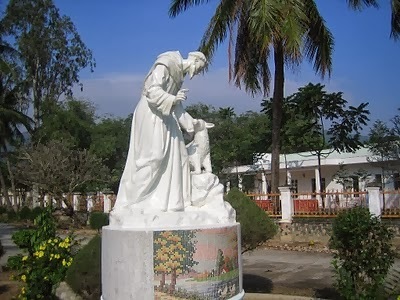
When he cries out to me, I will hear, for I am compassionate. – Exodus 22:27 (NIV)
The LORD is compassionate and gracious, slow to anger and abounding in love. – Psalm 103:8 (NIV)
When I was researching historical background for Part 1 of my novel, The Heart Remembers, which is set in Vietnam during the war, I discovered an interesting fact: Medical teams from the military hospitals were often sent into nearby villages when there was a lull in their hectic schedules to treat the locals. One of the places they visited was the Quy Hoa Leper Hospital in Binh Dinh province.
I was intrigued not only by the compassion shown by U.S. troops in the middle of an ugly war but also by the way this hospital treated lepers.
The hospital itself is located in a secluded cove, surrounded by mountains on three sides, with one of the nicest beaches in the area as the fourth boundary. But far from being depressing, the hospital grounds are more like a resort, and the patients live with their families in small, well-kept houses. They work, too — in the rice fields, the fishing industry, and in repair and craft shops.

That’s a far cry from the way lepers were treated in biblical times, when they were the “untouchables,” forbidden to associate with anyone else but another leper. They were to cry out “Unclean!” whenever healthy people were in the vicinity, and if someone touched a leper, that person was considered defiled and was then shunned.
Unable to live with their loved ones, lepers were relegated to colonies outside the town limits and, being unemployable, begged for handouts to survive.
We can understand the desperation the leper felt when he approached Jesus, dropped down on his knees, and said, “If you are willing, you can make me clean.”
The Son of God did not shun him. Instead, “filled with compassion, Jesus reached out his hand and touched the man. ‘I am willing,’ he said.”
I like the way The Message phrases it: “Deeply moved, Jesus put out his hand, touched him, and said, ‘I want to. Be clean.’”
The Son of God didn’t have to touch the leper. He wanted to. It would have been better if he hadn’t. Now he’d be considered defiled. But as one commentary put it, “Jesus’ compassion for the man superseded ceremonial considerations.”
Compassion is defined as “sharing the hurts of another and wanting to help.”
It’s one thing to feel sorry for someone. But it’s another to feel so sorry that you have to do something – anything – to help that person.
Think of the outpouring of love and help when disaster strikes: when Hurricane Sandy devastated the Eastern Seaboard, when a mentally unstable gunman shot and killed 20 children, ages 6 and 7, and six adults at Sandy Hook Elementary School. Or 9-11. People with no connections to anyone in the disaster-stricken areas dropped what they were doing, loaded up provisions, and drove hours to find a way to help.
Compassion trumps policy, procedure, ritual, ceremony, even common sense. Compassion is what drove Jesus. Compassion is what drives God. It is why he sent his Son to die in our place.
But we don’t have to wait until disaster strikes to show compassion. We can show it every day. Just look around. Ask God to open your eyes.
Who are the lepers in your world? The untouchables? The ones outside the city gate, shunned by “decent folks”?
Who can you reach out and touch today?
Fill me with Your compassion, Lord! Amen.
Read and reflect on Lamentations 3:21–23, 32; Mark 1:40–45.
Photo #1 of leper hospital, Quy Noon, Vietnam
Photo #2 of Qua Hot Beach, Vietnam
From God, Me, & a Cup of Tea, Vol. 3, © 2019 Michele Huey. All rights reserved.
June 3, 2023
B – Bread of Life

The ABC’s of knowing God better: the letter B
Read and reflect on John 6:25–59
I have treasured the words of His mouth more than my daily bread. – Job 23:12 (NIV)
“I am the bread of life. He who comes to Me will never go hungry.” – Jesus, as quoted in John 6:35 (NIV)
My late father-in-law used to say a meal wasn’t complete without bread.
I, myself, have always loved bread –fresh out of the oven, toasted, stuffed with potatoes and cheese, smeared with spicy tomato sauce and piled high with cheese and pepperoni and, occasionally a variety of vegetables, such as black olives and green peppers.
Bread has been a staple since man first figured out what to do with wheat. It has been called “the staff of life,” the mainstay of man’s diet.
Bread is mentioned all through the Bible: from Abraham serving bread to three heavenly visitors to his descendants strapping on their kneading bowls at the start of the exodus from Egypt; from God providing bread from heaven (manna) while they trekked the wilderness to the Promised Land to feeding bread baked on a hot stone to the depressed prophet Elijah centuries later as he fled the murderous Jezebel; from Jesus multiplying a few loaves to feed a crowd that numbered in the thousands to Him breaking bread at the last supper and telling His disciples, “This is My body, broken for you” and then breaking bread after accompanying two dejected, puzzled disciples to Emmaus after His resurrection. Bread is mentioned as early as Genesis 3:19.
Bread provides our bodies with needed fiber and vitamin B, which is essential to our digestive system and helps our bodies to use energy.
So why does bread get such a bad rap these days?
A loaf of bread made today with refined, “enriched” flour and loaded with preservatives to give it a longer shelf life is nothing like the bread our ancestors ate. We’ve so filled our stomachs with non-nutritional carbohydrates that adding bread to our daily diet overloads our systems. Low-carb diets abound in which bread is a forbidden food.
And so what was once the staff of life becomes a banned substance because we’ve developed cravings for sugars and starches that add the pounds.
And because we’ve become such a sedentary society. In biblical times, most people walked wherever they wanted to go. They worked in the fields, raising crops or animals. They lived physically demanding lives. No motorized wheels to help them get around (or wheels on the bottom of desk chairs).
“Why spend money on what is not bread, and your labor on what does not satisfy?” God admonishes us through the prophet Isaiah. “Listen, listen to me, and eat what is good, and your soul will delight in the richest of fare” (Isaiah 55:2).
The richest of fare: God Himself.
Jesus said He is the Bread of Life. He provides us with what we need to live healthy spiritual lives, now and for all eternity.
His Word is bread to the spiritually hungry.
“Man shall not live by bread alone, but by every word that proceeds from the mouth of God,” Jesus told His tempter in Matthew 4:4, quoting the Old Testament (Deuteronomy 8:3).
God’s Word is our daily bread.
Jesus is the Staff of Life.
Tell me, do you include Bread in your daily diet?
Make me hungry for You, O Lord. Amen.
From God, Me, & a Cup of Tea, Vol. 3 © 2019 Michele Huey. All rights reserved.
May 27, 2023
A: ALPHA – Who’s in Charge?

NOTE: Beginning this week, we will explore the character of God as we seek to know Him better, using the letters of the alphabet. Today we look at the letter A.
In the beginning God . . . – Genesis 1:1 (NIV)
I am the Alpha and the Omega . . . – Revelation 1:8; 21:6; 22:13 (NIV)
“God is not our buddy or our errand boy,” Marlene Bagnull notes in Write His Answer, her Bible study for Christian writers.
I read those words in 1996 and never forgot them. They extend into every area of my life, not just my writing and speaking.
You see, too often I forget who’s in charge and treat God like my chum or my gopher (you know, go-fer-this, go-fer-that). I shoot up prayer requests like orders, expecting Him to answer when I want, which is usually right now, and the way I want. It’s like I’m the master and He’s the servant.
Yes, the Bible tells us to pray, to lay our requests before Him, to ask, to seek, to knock, the cast all our cares on Him, and He will hear and will answer. In fact, He knows our needs before we even ask.
But none of the verses I’ve alluded to tell us to tell Him how to answer or when to answer.
In our me-first world, we tend to think we’re in charge.
Mankind has always had that problem – thinking he’s the center of the universe. Remember the uproar when Copernicus, in the sixteenth century, theorized that the earth revolved around the sun? How dare him! It wasn’t until the next century that Galileo and his telescope proved him right.
But we still have that problem of putting ourselves as the center of the universe. Everything and everyone else, including God, revolves around us and our wants. Just look at the way people drive. Me-first. Get out of my way. The rules of the road aren’t for me, so why should I use turn signals, stop at stop signs (isn’t slowing down enough?), or turn on my headlights when it’s raining or dusky? And if you’re going too slow for me, I’ll ride your tail until you speed up or I get a chance to pass you, even in a no-passing zone.
Yikes!
The Bible begins with four simple words: In the beginning God.
In the beginning of what? Of the created universe. Of time.
In the beginning God was already there. He created time.
The Hebrew word used for God in Genesis 1:1 is Elohim, and means “mighty God or supreme God.” Another name for God is Adonai, translated “Lord” and means “Master or owner of all things.” And why wouldn’t He be? He created it all.
God is the Alpha (the first letter of the Greek alphabet), and everyone knows the Alpha is the undisputed leader of the pack.
God is the Omega (the last letter of the Greek alphabet), the One who remains standing after the final battle is fought, after the earth as we know it disappears, after a new heaven and a new earth appear, after time ends and eternity begins.
God is creator, master, the sovereign Lord of all that happens from the beginning to the end, the One who rules over human history.
He’s not anybody’s good buddy or errand boy.
Remind me, Lord, that You, not I, are the One in charge. You are Adonai, the Alpha of my life. Amen.
From God, Me, & a Cup of Tea, Vol. 3 © 2019 Michele Huey. All rights reserved.
May 20, 2023
Sadie’s Story

The LORD your God is with you, he is mighty to save. He will take great delight in you, he will quiet you with his love, he will rejoice over you with singing. (Zephaniah 3:17 NIV)
When the 11-year-old Chihuahua was dropped off at the crowded animal shelter, she had obvious health problems. Two weeks went by and no one showed interest in adopting her. After all, who’d want an old dog with health issues? So Sadie was scheduled for euthanasia.
Enter one young lady with a heart for the hurting—and with a passion for God’s creatures. When Sarah McKenrick and her fiancé, Jonathan Cherry, visited the shelter, “to give some animals some love,” a volunteer told her the sad story of the Chihuahua.
“She had been with a family for 11 years,” Sarah told me, “and they just dumped her at the shelter. My heart broke, and I couldn’t let her be put down like that. We adopted her.”
It was while the veterinarian was spaying Sadie that he discovered still another health problem and called Sarah.
“Are you sure you still want to adopt her?” he asked.
“Absolutely!” Sarah said.
With a heart murmur, congestive heart failure, fluid in her lungs, a bad stomach due to hookworms, and “a long list of other issues,” Sadie was given three months to live—“a hospice situation,” Sarah said. “She was 3.25 pounds and terrified.”
That was three years ago.
“Today she is on ZERO medication, the heart murmur is gone, and she’s a chunky 6 pounds!” reports Sarah, who is now Mrs. Jonathan Cherry.
That’s what love can do.
In Sarah’s and Jonathan’s love for Sadie, who now responds to the name “Bitty,” I see God’s love for all humanity. God’s love for me. God’s love for you. Each one of you. It doesn’t matter who you are, what your nationality is, what your beliefs are, what you do for a living, or how old you are. It doesn’t matter that you have “SIN” written all over you. It doesn’t matter if you’ve messed up. Or if you are messed up.
It doesn’t matter if you’re what the world calls “damaged goods.” It doesn’t matter what you’ve done, who’ve you’ve been with, where you are.
Read the Gospels. Over and over you’ll see God’s Son reaching out to the outcasts of society: a woman at a well in Samaria (John 4:1–26). She had three strikes against her: She was a woman—women were not at the top of the social ladder in those days; she was a Samaritan—the Jews hated the Samaritans; and she’d had five husbands and was living with a man who was not her husband.
But she wasn’t out—not by God’s standards.
Neither are you.
Then there was the leper who asked Jesus for healing and Jesus touched him (Matthew 8:1–4; Luke 5:12–14). He touched him! My goodness, you didn’t even breathe the same air as a leper in those times, let alone touch one.
But, in God’s eyes, he wasn’t untouchable.
Neither are you.
And then there was Levi, the tax collector, whom Jesus called to be one of His 12 apostles (Mark 2:13–17; Luke 5:27–31). A tax collector—a despised traitor in the eyes of the Jews.
But he wasn’t despised by God.
Neither are you.
You may know Levi better by his name as one of Jesus’ disciples—Matthew, which means “gift of the LORD.”
That’s what happens when Jesus comes into your life—it changes, you change—transformed from the inside out. It all starts with the unconditional love of God.
Sadie’s story, you see, is your story.
When I’m feeling down on myself, O Lord, remind me of how very much You love me. Amen.
Read and reflect on Romans 8:31–39.
© 2023 Michele Huey. All rights reserved.

Now Mr. and Mrs. Jonathan Cherry with Sadie, who passed away in September 2016.
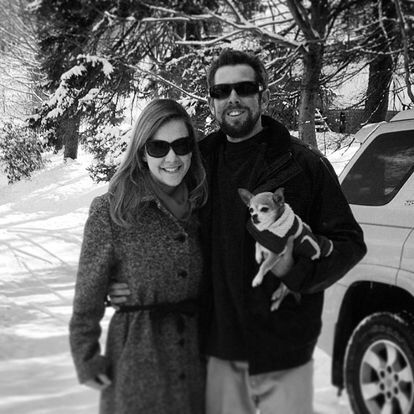
God, Me, and a Cup of Tea
- Michele Huey's profile
- 19 followers



